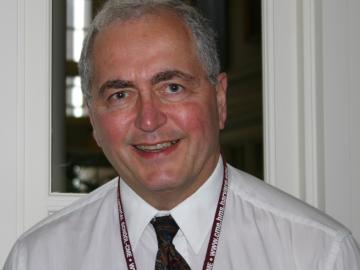 The Department is delighted to announce the promotion of Ed Nardell, MD, to Professor of Global Health and Social Medicine.
The Department is delighted to announce the promotion of Ed Nardell, MD, to Professor of Global Health and Social Medicine.
Dr. Nardell is a major contributor to efforts to treat and control tuberculosis. He joined the Program in Infectious Disease and Social Change in 2002 and has served as Senior TB Control Specialist, guiding our faculty in Peru and Russia to improve multidrug-resistant tuberculosis treatment outcomes, expand access to treatment, and prevent the transmission of MDRTB among vulnerable communities.
Dr. Nardell was well positioned to be an early expert on MDRTB. His experience dates back to 1979, when he was named TB Control Officer for the Boston Department of Public Health. He led the local response to the resurgence of tuberculosis in the U.S. from 1985 to 1992 that was associated with HIV co-infection and multi-drug resistance. In 1981, Ed was named Chief of Pulmonary Medicine at The Cambridge Hospital as well as TB Control Officer for the City of Cambridge. In 1983, he became the TB Control Officer for the Massachusetts Department of Public Health, serving as the principal medical consultant for more than 30 public clinics across the state. That same year, Dr. Nardell was investigating an outbreak among Haitian immigrants in Cambridge.
Dr. Nardell soon became a leading researcher in tuberculosis control and pathogenesis. His investigation of an outbreak in a Boston homeless shelter challenged commonly held beliefs about the disease’s epidemiology, leading to his 1986 NEJM paper on exogenous reinfection, which is now recognized as a critical pathogenic pathway in the global tuberculosis epidemic. This work led to a longtime collaboration with Dr. Richard Riley, an expert on airborne transmission and control. Dr. Nardell's 1991 investigation of a tuberculosis outbreak in a poorly ventilated office building spurred his pioneering research in building design and engineering for airborne infection control.
Over nearly two decades, Dr. Nardell's expertise as a teacher and as a clinical innovator has helped to build the knowledge base in the Department of Global Health and Social Medicine to advance research and influence policy to control MDRTB in resource-poor countries. In addition to mentoring our faculty and trainees, Dr. Nardell advises on the development and design of MDRTB research projects as well as innovations such as inhaled antibiotics to enhance patient completion of treatment regimens and the use of ultraviolet irradiation to prevent airborne transmission of tuberculosis in hospitals. He developed the transmission control protocol called FAST—Find cases Actively, Separate patients with MDRTB from those with drug-susceptible disease, and Treat effectively—and is supporting its application in Russian Federation countries, where nosocomial transmission continues to feed the MDRTB epidemic.
Reflecting his broad range of contributions to science and technology and his excellent reputation, Dr. Nardell is also appointed Professor of Medicine at HMS and both Associate Professor of Environmental Health and Associate Professor of Immunology and Infectious Diseases at the Harvard T.H. Chan School of Public Health. Dr. Nardell holds an honorary appointment as Extraordinary Professor of Medicine in the Department of Infectious Diseases at the University of Pretoria in South Africa.
We are grateful to Ed for his leadership and continuing innovations and guidance. Congratulations to Dr. Nardell on this well-deserved promotion.